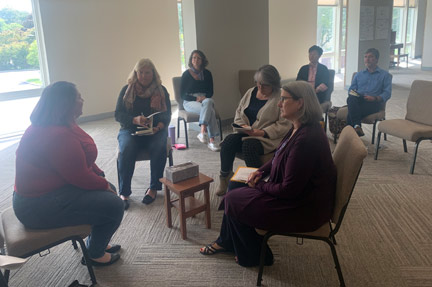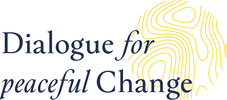Dialogue for Peaceful Change Reunion and Recharge
April 19-20
Navigating Change and Conflict: The Dialogue for Peaceful Change Methodology
Since 2022, the presbyteries of Baltimore, National Capital and New Castle have come together to train over 90 pastors and church leaders in the Dialogue for Peaceful Change (DPC) methodology.
DPC was developed in response to the sectarian divisions in Northern Ireland, primarily through the experiences of the Corrymeela Community. (Corrymeela is Northern Ireland’s oldest and largest peace and reconciliation organization.) It has evolved through trial and error, driven by the necessity to find practical solutions to real world conflicts. The DPC methodology has been applied in various settings beyond traditional conflict zones, such as non-governmental organizations and local communities concerned with fostering systemic change. Examples include youth and gang violence intervention projects in California and Sweden.
DPC in the Mid-Atlantic: A Global Practice Mapped Out Locally
DPC has been embraced by the 3 presbyteries because the skills needed to effectively navigate the challenges of conflict and change resistance can only be built through practice, learning and reflection. Grounded in deep empathy and understanding of human behavior, the DPC approach helps us understand why change processes might fail, and what we need to succeed.
DPC Facilitator Training: Offered Yearly, Open to All
ny active leader or member in the 3 presbyteries (not just Pastors and Elders) is eligible for DPC Facilitator training. We aim to equip DPC Facilitators with the skills to navigate complex conflicts and to foster peaceful change by:
- enhancing participants’ understanding of conflict and personal and cultural responses to it;
- locating key issues and dynamics that keep conflicts from moving forward; and
- focusing on skill development to work through conflict toward a healthy future.
We offer DPC Facilitator training yearly, typically in a four-day workshop format structured into two main modules: Understanding Conflict and Change; and Empathic Communication and Mediative Dialogue. We request that those who are able contribute at least $250 to offset training costs.

DPC Facilitators: An Ongoing Resource for Congregations
We now have an impressive pool of DPC Facilitators across the 3 presbyteries in addition to certified DPC Trainers. These individuals are equipped to help transform conflict, including by offering change navigation modules that can be taught (or facilitated) as stand alone workshops or as part of a larger conference or discernment process.
Examples of situations where DPC Facilitators can partner with you to discern a healthy way to move conflict forward include when you/your congregation are:
- Feeling caught in a recurring pattern of conflict and trying to discern your role in it. (A DPC facilitator can be an effective thought partner with tools to help unpack it.)
- Interested in moving your Session or committee into a healthier conversation about the future. (A DPC facilitator can help identify and lead exercises appropriate to your needs.)
DPC Facilitators can also investigate and evaluate whether your conflict might benefit from DPC mediation. (DPC mediation is always voluntary and involves 2 facilitators working with both parties through 6 steps of empathic listening and creative problem solving.)
Continuing DPC Facilitator Education through our Community of Practice
Trained DPC Facilitators are invited to join our Community of Practice (CoP), which meets monthly, every 3rd Thursday (alternately 9am or 4pm) on Zoom. CoP sessions are designed to:
- refresh our knowledge of the DPC conflict models and tools;
- workshop conflict case studies from our contexts; and
- offer support and suggest possible ways to move conflicts forward.
An annual in-person refresher workshop is offered to all DPC Facilitators to renew and deepen their knowledge and skills.
Facilitators are also encouraged to reach out to each other and DPC trainers for support throughout their ministry.
Contact Persons:
Baltimore Presbytery – Susan Krehbiel, skrehbiel@baltimorepresbytery.org
National Capital Presbytery – Tara Spuhler McCabe, tspuhlermccabe@thepresbytery.org
New Castle Presbytery – Shannon Hanson, shansondelaware@gmail.com


